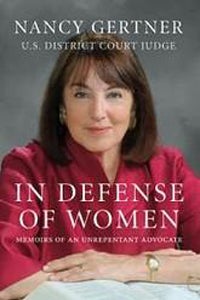Brilliant trial attorney, unabashed feminist, passionate advocate for civil rights, and one of Boston’s most respected—and controversial—federal judges, U.S. District Court Judge Nancy Gertner joined the HLS faculty this month as a Professor of Practice after retiring from 17 years on the bench.
As renowned for her outspokenness as for her carefully considered decisions—explained in lengthy written opinions—Gertner will offer students an insider’s view of the criminal justice system, the challenges judges face today in a 24/7 news cycle, and more.
One thing is certain: she won’t pull any punches. Gertner—recipient of a long list of honors and awards, including, in May of this year, the Massachusetts Bar Association’s Hennessey award for judicial excellence—has always been remarkably forthright with her opinions on everything from sentencing guidelines (about which she’s written numerous law review articles) to the difficulties women face in the legal profession.
Author of several books including the recently published “In Defense of Women: Memoirs of an Unrepentant Advocate (Beacon Press 2011), Gertner, who was a visiting professor at HLS in the ’80s and has taught at Yale, BC Law, and elsewhere, says she’s very excited about joining the HLS faculty. “I love to teach,” she says.
Insights from the Federal Bench
In nearly two decades as a federal judge, Gertner has developed strong opinions on what works—and doesn’t—in the criminal justice system. Unlike many of her colleagues, who fear exposing themselves to criticism, Gertner has always been eager to share her beliefs. Indeed, it is a judge’s responsibility to explain decisions to the parties and the public, she insists—anything else is a failure of courage.
On Being a Passionate Advocate
Gertner, a Yale Law School graduate, planned to be a law professor and had no interest in actual law practice until she began using her new skills to help the disempowered as a civil rights lawyer in Boston. But, as one of a very few women trial lawyers in the ’70s, she struggled with self-doubt (“I didn’t have any self-confidence, I knew how to fake it,” she recalls) until she began winning in a number of celebrated cases and developed a reputation as one of New England’s best trial lawyers.
On Joining the Harvard Law Faculty
One of Gertner’s best-known cases was her representation of Clare Dalton, an assistant professor at HLS who filed a complaint against the school when she was denied tenure in the late 1980s (the case settled in 1993 when HLS agreed to fund a domestic violence program at Northeastern Law School founded by Dalton, who had moved on to that school.) HLS is a different place today, far more supportive of women, says Gertner, and she is eager to bridge the academy and the world of practice as an HLS Professor of Practice.
Life After the Bench
The indefatigable Gertner, who just completed a memoir, plans to write op-eds, more books and law review articles, including a memoir about a young alleged gang member in whom she took an interest when he appeared before her for sentencing, but who later was gunned down on the streets of Boston. She is excited about teaching, and is looking forward to this next phase of her life. “If anyone conceives of this as a retirement,” she says, with a laugh, “they’re wrong.”
Women and the Law
A trailblazer in the ’70s as a woman trial lawyer, Gertner has felt a close personal connection to many of the women she represented in cases of gender discrimination, sexual harassment, and other issues of equality. While women lawyers have made many advances in the past decades, they leave the legal profession in much greater numbers than men, Gertner laments, and she believes the profession—and society—have a long way to go in adequately supporting working women and their families.
